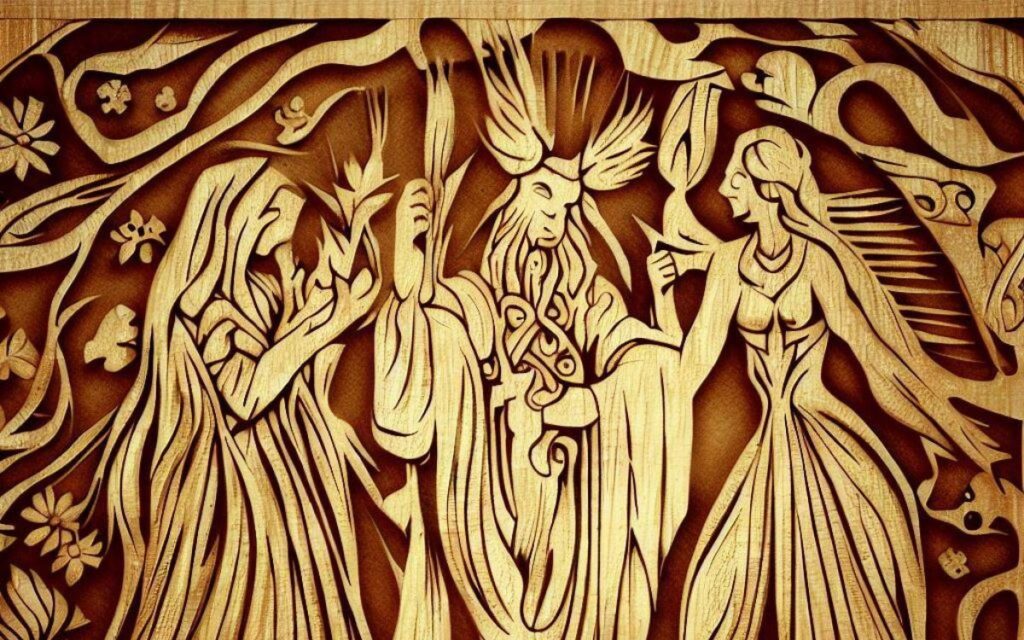Anglo-Saxon gods were an integral part of the religious beliefs and mythology of the Anglo-Saxon people. Although their pantheon shared similarities with Norse mythology, the Anglo-Saxon gods had their own unique characteristics and significance. Here is an overview of the major Anglo-Saxon gods, their Nordic equivalents and some interesting facts about them…

Woden
Known for: War, wisdom, poetry, and death.
Nordic equivalent: Odin
Woden was the chief god of the Anglo-Saxons, revered as the leader of the gods. He held domain over war, wisdom, poetry, and death. Many Anglo-Saxon rulers claimed lineage from Woden, showcasing his importance in their society. The name “Wednesday” derives from “Woden’s Day”. Woden’s association with death contributed to the Anglo-Saxon concept of the Wild Hunt, a spectral procession of ghostly hunters led by Woden himself.
Places named after Woden in the UK: Wednesfield, Wednesbury, Wodensborough, Woden Croft, Woden Road.
Thunor
Known for: Thunder and strength.
Nordic equivalent: Thor
Thunor was the god of thunder and strength, often depicted wielding a hammer. He served as the defender of gods and humans against chaos. “Thursday” is named after Thunor, honouring his role in Anglo-Saxon mythology. Thunor’s hammer, Mjölnir, was believed to protect against the forces of evil and was a symbol of his power.
Places named after Thunor in the UK: Thorpe, Thundersley, Thursley, Thurgarton, Thurlaston.
Tiw
Known for: War and justice.
Nordic equivalent: Tyr
Tiw, also known as Tyr, was a war god associated with courage, fairness, law, and justice. The name “Tuesday” originates from “Tiw’s Day”, reflecting his importance in the Anglo-Saxon calendar. In Norse mythology, Tyr lost his hand while binding the monstrous wolf Fenrir, displaying his bravery and sacrifice.
Places named after Tiw in the UK: Tewkesbury, Tewin, Tewkeswood, Tees, Tewitfield.
Frige
Known for: Love, fertility, and the household.
Nordic equivalent: Frigg
Frige, or Frigg, was the goddess associated with love, fertility, and the household. She played a crucial role in Anglo-Saxon culture, ensuring prosperity and well-being. Frigg was the wife of Woden and held significant influence over the affairs of gods and humans.
Places named after Frige in the UK: Fridaythorpe, Frisby, Frithville, Friston, Fritham.
Eostre
Known for: Spring and the dawn.
Nordic equivalent: Ostara
Eostre was the goddess of spring and the dawn, symbolizing renewal and rebirth. The Christian festival of Easter likely derived its name from Eostre, reflecting shared themes. Eostre was associated with hares and eggs, which later became popular symbols of Easter.
Places named after Eostre in the UK: Eastry, Eastergate, Eastrea, Easington, Easton.
Ing
Known for: Fertility and agriculture.
Nordic equivalent: Ingwaz
Ing was the god of fertility and agriculture. He was considered the legendary ancestor of the Ingvaeones, including the Angles, and symbolized prosperity and abundance. Ing’s association with fertility extended to the naming of the English county of “East Anglia” (Eastern Angles) after the Angles who revered him.
Places named after Ing in the UK: Ingleton, Ings, Ingatestone, Ingol, Ingham.
Seaxneat
Known for: Patron god of the Saxons.
Seaxneat was a tribal god specifically worshipped by the Saxons. Associated with the Saxons’ identity, he may have been considered a form of the god Tiw. Seaxneat’s name comes from the Old English words “seax” (a type of sword) and “neat” (cattle), possibly symbolizing warfare and prosperity.
Places named after Seaxneat in the UK: Saxmundham, Saxtead, Saxby, Saxlingham, Saxlingham Nethergate.
Weland
Known for: Metalworking and craftsmanship.
Nordic equivalent: Volund
Weland was the god of metalworking and craftsmanship, analogous to the Norse blacksmith god, Wayland the Smith. He was revered as the master of all metalworkers, creating both functional and beautiful items. Legends surrounding Weland often depicted him as an exceptional craftsman, capable of crafting magical objects of great power.
Places named after Weland in the UK: Welwyn, Welton, Welling, Wellow, Wellington.
Beowa
Known for: Hunting and agriculture.
Beowa was associated with hunting and agriculture, vital aspects of the Anglo-Saxon way of life. As a provider and protector, he ensured successful hunts and bountiful harvests. The name “Beowa” is closely connected to “barley”, emphasizing the god’s agricultural significance.
Places named after Beowa in the UK: Bewdley, Bewsborough, Bewsfield, Bewcastle, Beaworthy.
Wyrd
Known for: Fate and destiny.
Wyrd was not a conventional deity but a concept personified as a goddess. She represented fate or destiny in Anglo-Saxon belief, governing the course of events in the universe. The concept of Wyrd emphasized the belief that present actions influenced future outcomes. Wyrd played a crucial role in the poetic tradition of the Anglo-Saxons, influencing their sense of fatalism and the cyclical nature of life.
Places named after Wyrd in the UK: Wyre Forest, Wyresdale, Wyre Piddle, Wyreside, Wyre Estuary.

